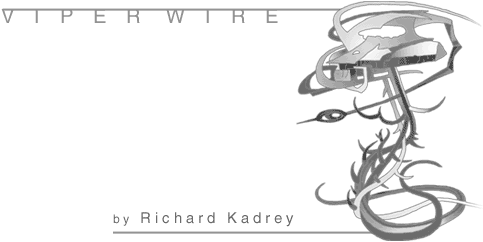10.23.02

|
|
|
My Exquisite Corpse
I hadn't been feeling well for weeks when I went to see Dr. Breton, the surrealist surgeon. He'd graduated with top honors from the same Parisian university that had given us Salvador Dali, the famous brain specialist. Since both practiced the same Paranoid-Critical method of healing, which relied more on chance processes and instinct than on a lot of flashy "medical" training, I felt in good hands. We began with a quick exam. Dr. Breton dispensed with traditional, dead methods of medicine and went his own bold way. Instead of anatomy charts, his walls contained maps of Kathmandu and the Cleveland sewer system, along with a glossy poster of Anna Kournikova, complete with his handwritten astrological and I Ching annotations, including her favorite color and food (baby blue and Buffalo Wings). The first words Dr. Breton said to me were, "Beauty must be convulsive, or it will not be. Now, turn your head and cough." The good doctor pronounced me as fit as "a teacup of chicken fat, glistening in the flames of the burning Hindenburg." Healthy as I was, he recommended immediate surgery, since I was already there and the table was free. We began with quickie séance, in which Dr. Breton requested surgical advice from the late, great Harry Houdini. The doctor seemed to be paying inordinate attention to his pretty blonde nurse, who giggled when he'd grab her thighs under the table. This, he explained to me was standard procedure in an "irrational anatomy" exam. Besides, given the choice between my spotty, larva-colored thighs and his tanned nurse's, which would I examine? At once, I was reminded of the doctor's brilliance and didn't question his technique again. Dr. Breton was a psychic surgeon, and dispensed with the use of crude "instruments" and "those sharp, scary thingies." After fortifying himself with a couple of shots of Jagermeister, and sterilizing his bare hand in a warm bottle of Mr. Pibb, Dr. Breton plunged his left hand deep into my abdomen. Seconds later, he pulled out a set of playing cards (a good poker hand: aces and eights), a string of paper flowers, the recipe for Kishka his wife had been looking for, a large liver tumor, and three live pigeons. Leaving Dr. Breton's office, I felt like a new man. That I had a seizure on the bus home and died a few hours later should, in no way, be seen to reflect on the doctor's healing prowess. His last observation says it all: "Death is the ultimate side effect of life," he told me, followed by, "No cash refunds."
Richard Kadrey is a member of a small group of innovative writers, including William Gibson, Bruce Sterling, John Shirley, Pat Cadigan, Tom Maddox, and others, who changed the face of science fiction in the 1980s. He also creates art. He lives in San Francisco. |
home | stories | columns | archive | faq |
The Infinite Matrix is sponsored by
Matrix.Net,
the
Internet's oldest and most experienced
independent performance analysts.
Stories and articles © copyright 2001, 2002 by the original authors.
Illlustrations © copyright 2001, 2002, Jay Kinney & Paul Mavrides.
Site graphics, logo, and html coding © copyright 2001, Matrix.Net.
All other material © copyright 2001, 2002, Eileen K. Gunn.
All rights reserved.